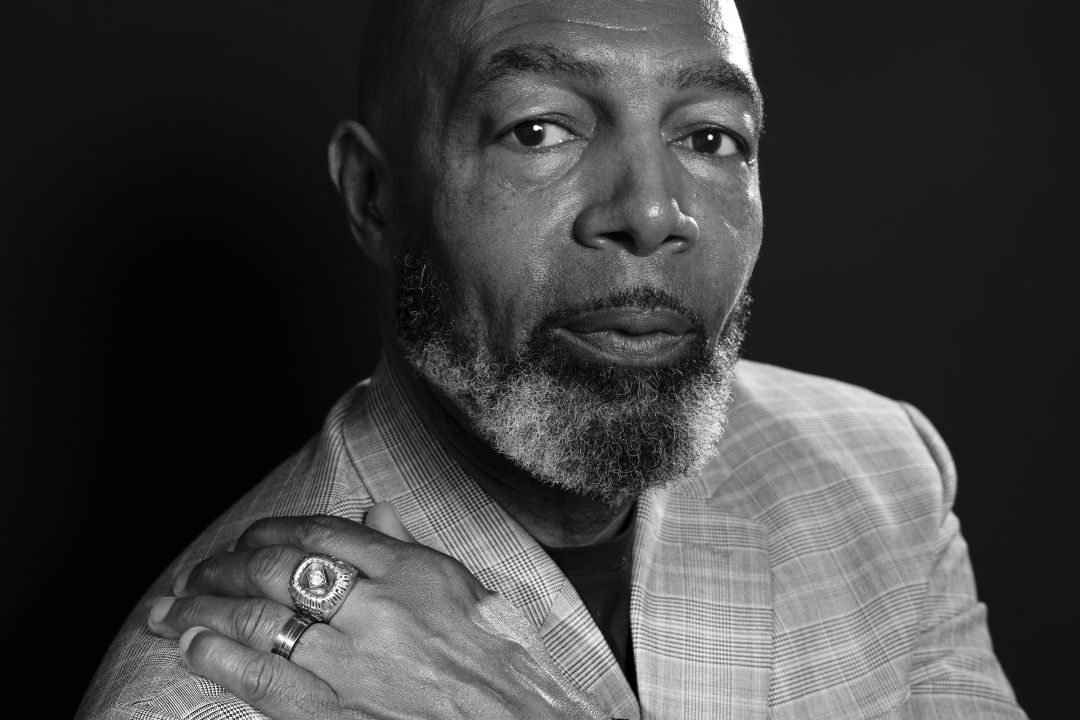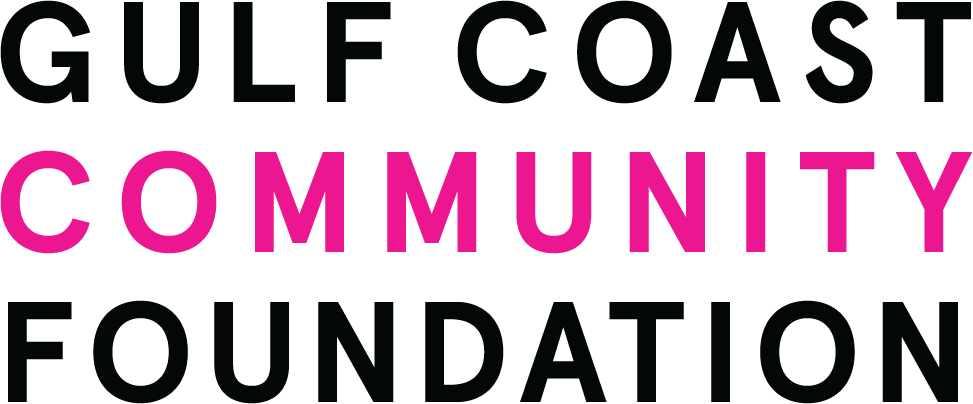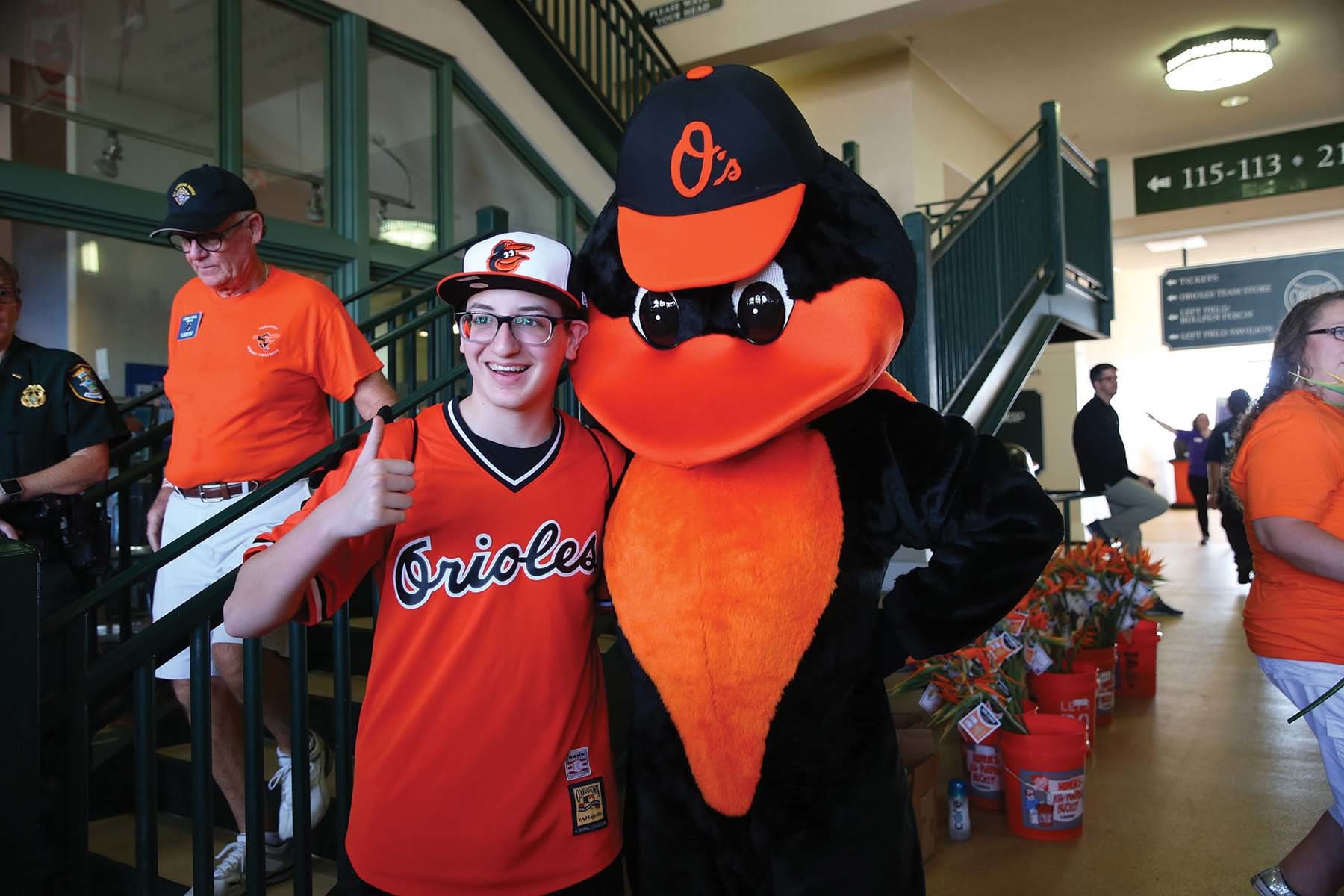World Series Champ John 'T-Bone' Shelby on His Passion for Baseball and Never Giving Up
This article is part of the series Listening to Diverse Voices, proudly presented by Gulf Coast Community Foundation.

Image: Michael Kinsey
It’s safe to call John “T-Bone” Shelby a baseball legend. Shelby was drafted by the Baltimore Orioles in the first round of the 1977 Major League Baseball amateur draft. He spent five seasons in the minors before making it to the major leagues—or “the show,” as it's called—in 1981.
The 6'1" Shelby—who was nicknamed "T-Bone" because of his slender frame—played center field for 11 years. In 1983, he earned his first World Series ring with the Orioles, then won again in 1988 with the Los Angeles Dodgers. (To put those championships into perspective, experts say winning two World Series is less likely than pitching a perfect game or hitting 500 career home runs.)
In 1992, after two years with the Detroit Tigers, Shelby retired from playing baseball and spent five seasons as a minor league manager. Working with manager Jim Tracy, Shelby later went on to become the Los Angeles Dodgers' first base coach; in 2006, when Tracy became the manager for the Pittsburgh Pirates, Shelby moved to Pittsburgh to take the first base coach job with the Pirates. He also had coaching stints with the Orioles, Milwaukee Brewers, Albuquerque Isotopes and Atlanta Braves.
Shelby, who was born and raised in Lexington, KY, has been married to his high school sweetheart, Trina, for 44 years. They now live in Sarasota and have six children and seven grandchildren, with one more due next month. (We profiled his son, former MLB player Jeremy Shelby, as part of this series last year.) Now retired, Shelby, 66, says he’s catching up on everything he missed with his family during his 42-year career. But is he really done with coaching? Only time will tell.
This interview has been edited for length and clarity.
What was it like growing up in Lexington?
“I wouldn't trade my childhood for anything. I didn’t grow up in an affluent neighborhood, but I didn’t know that. I had the best friends and family. It was a tight-knit community, and we are still close.
“I never really understood racism growing up in a Black community. We were who we were. That’s all I knew.
“When I was 12, I decided to play baseball in a mixed [race] league. I didn’t know what I was getting into. I was one of two Blacks on the team. Before that, I'd played on an all-Black league.”
How did that go?
“At the time, I didn’t feel any pressure or prejudice. When you’re young, you don’t feel a lot of it. It helped me to understand what it was like playing with other races. I enjoyed it, and it helped me throughout my career—and to this day.
“I loved playing baseball; it was my passion. It was no different playing with another race than playing with my friends. It was still baseball.”
Did you experience racism in your professional baseball career?
“My first year in the MLB, I was playing center field against Boston. At the games, there were beach balls that fans would hit around during the game. Someone knocked the beach ball onto field, and I was hoping the grounds crew would get it because the game was in progress.
“The fans were screaming for me to knock the ball back up into the stands, but the center field wall was too high. I picked up the ball and tried to get it back into the stands, but the ball had a backspin on it. I tried three times to get the ball into [the crowd's] hands, but it went in the opposite direction and came back to me every time. The fans were screaming, the umpire was screaming to get the ball off the field, I was nervous, the game was going on, and everyone was waiting on me. I tried to throw the ball into the stands one more time, and it didn’t make it. So I stepped on the ball and burst it.
“As soon as I did, out came the loudest, ‘You big, Black, n-word!’
"Oh, my goodness. It was so loud, my teammates heard it on the field. That shocked me. I went back to center field. The umpire was yelling for me to get the ball off the field, and I told him, ‘You go pick it up.’ I was not going back to that wall. I had to tune out the slur and get over the initial shock to get my head back into the game."
Did you experience other race-related incidents during your career?
“This story also happened during my rookie year in professional baseball. The ball club used to have host families for players, because it was hard to find apartments back then. My general manager handed me an address and said, ‘T-Bone, here’s where you’re staying.’ I drove over to the house, which was owned by an older white lady. I knocked on the door and, through the screen door, the woman barked, ‘Who are you?’ I said, ‘I’m John Shelby with the Orioles. My general manager sent me here. I’m staying with you.’ But by the time I'd said those last words, she slammed the door in my face and said, ‘No, you’re not!’ That was my ‘welcome to baseball’ experience.
“A lot of race-related incidents happened in my career, but the experience of switching leagues when I was a kid and playing with players of different races prepared me for the type of lifestyle that was ahead for me. I know that without a doubt.”
How did you know that you had what it takes to realize your dream?
“When I was a young kid, I always had a passion for baseball. It was in me. I never missed a summer playing baseball. It excited me. I wanted to be good, and I practiced so that I would be.
“When I was 14 years old, I wanted to quit because my friends didn’t play baseball and I wanted to spend the summer with them. I told my coach, Bill Mullins, that. He told me, ‘You’re not quitting. With the talent and ability you have, if you keep working hard, one of these days I'll buy a ticket to watch you play in the Major Leagues.’ That’s when it struck me that I was a good ball player. That never left me.
“After I got traded to the Dodgers [from the Orioles], we played the Cincinnati Reds in 1987. I called [Coach Mullins] and told him that he didn’t have to pay for tickets to come see me in the game—I'd gotten 'em. He came, and we are still friends to this day. When the Dodgers won the World Series in 1988, I gave him one of my game jerseys.”
Was Coach Mullins white or Black?
“He was white. From the time I was 12 until I made it to professional baseball, all of my coaches were white.
“Bill Mullins was tough on me, but he saw something in me. He was tougher than I thought I needed, but he helped shape my life. I don’t think I had enough respect to understand what he was doing at the time.
"For instance, I could pitch, but I liked playing the infield. When Coach Mullins put me in to pitch, I always complained about my arm hurting. But he wouldn’t take me out. He’d say, ‘I don’t care how your arm feels, you’re staying in this game.’ He stayed on me.
“When I was about 14, he scheduled a game in my Black neighborhood with a team from Cincinnati. He had me pitch against the team. The guys were older than me and were tearing me apart. But he wanted my community to see me play. I cried and told him to take me out of the game, but he refused. He let me cry in front of my friends and family and said, ‘I’m not taking out until you finish.’ He never let me quit. That taught me that regardless of what you’re going through, you can’t quit.
“I'm thankful for that. Not only did it shape me as a player, it also shaped me as a person. It’s what Trina and I poured into our children: if you start something, you’re going to finish, no matter how hard it gets. It’s advice that I also give to young people.”
In baseball, a switch hitter bats right-handed and left-handed, usually right-handed against left-handed pitchers and left-handed against right-handed pitchers. You learned how to switch hit at age 21—no easy feat. Tell us about that.
“Learning to switch hit was the toughest thing in my life that I was able to overcome. I was 21 and I'd never hit left-handed.
“One of my hitting coaches saw me playing around and hitting from the left. He said, ‘I didn’t know you were a switch hitter.’ I said, ‘I’ve never switch hit in my life,’ and he replied, ‘I just saw you!’ From that moment, the coaches turned me into a switch hitter. I had to face right-handed pitchers [and hit left-handed] every day, sometimes two or three times. It was the worst struggle of my life. Finally, during the last couple weeks of the season, it clicked. I started making contact and getting hits.
“Lance Nichols is a coach I owe a lot to. I wanted to give up on switch hitting, but he said, ‘We’re going to keep doing this until they tell us we’re not doing it anymore.’ We were playing in Miami at the time. He told me to meet him at 10 a.m. during the season and he threw batting practice to me. He even did it when his family came to town. He was serious about the game.
“In my professional career, I give him all the credit for his persistence in helping me getting over something I had never done—and at a late age. Five years later, I was in the major leagues and switch hitting was valuable.
“Coach Mullins and Coach Nichols believed in me and wouldn’t let me quit. I stuck with it regardless of how hard it was. And it paid off.”
Athletes have to deal with their own inner critics as well as sports critics and commentators. As a Black man, you also had to deal with racism. How did you manage?
“My dream was to be an MLB player. Once I started the process of living out that dream, I knew it would be hard work. Whether I had a good or bad season, I knew I had to work hard again to get to the next season.
“One of the realities of the game that I quickly learned is about the number of players who get drafted every year. In the Orioles organization, when 30 players got drafted, it meant that 30 players had to go. That happened every year. I knew I had to work hard because someone would be released.
“So, to answer your question, I didn’t worry about the other things. I concentrated on myself and the work that needed to be done—and I never shied away from hard work. Whatever it took for me to be an MLB player, I put the time in. I never wanted a coach to say anything bad about me. Once you get into professional baseball, it’s on you. Nothing can be blamed on anyone else.
“I didn’t let the exterior things invade my mind. Playing the game at that level is hard enough.”
Sounds like it’s just as much a mental game as it is physical.
“When they were away from home, a lot of guys would miss their family and friends. And at times, it was tough. I had limited time at home. I would get home [for the year] in October or November, but when February rolled around, it was time to get ready for spring training. When I left, I wouldn’t see the children until school was out [in the summer].
“When I was playing in L.A., there was a three-hour time difference. I would be waking up when the kids were in school. At night, when I got home, they were already asleep. Later in my coaching career, I would stay up until 3:30 a.m., which was 6:30 a.m. Kentucky time, to talk to the kids.
“When you let those emotions get in, especially when you’re struggling, it’s hard to get over them. But I had to stay focused. This was my job and how I provided for my family."
What is life like after a baseball career like yours?
“Covid hit while I was coaching for the Atlanta Braves. I hadn’t been home in the summer since 1976. There were many firsts during that time—like dinner on my deck with Trina [for the first time] in the 26 years we'd owned our home. That was the first time that I cut grass in the summer in my 42-year career.
“One of the things that it's helped is my marriage. When Covid hit, Trina and I saw each other every day. This was unusual, but it helped us know each other. When I was in the MLB, I went home in the off season and the time was focused on family because I would only be around for a couple months. When the family came to visit me, wherever I was living, I was still on the road. I was in and out of their lives.
“Covid gave me a better understanding of life outside of baseball. There’s a high percentage of divorces after players and coaches retire. The reason is because we’re always away. When we come home in the off-season, time is short. When a baseball career is over, players and coaches don’t have that to go back to. Being home [during Covid] gave me a greater understanding and appreciation for Trina and everything she did with our children."
What would you like your white friends or acquaintances to be doing right now?
“Have a better understanding of the complaints from the Black community. There’s a purpose for those complaints.
“For instance, my wife is a nurse. While working in Lexington, she had a Black lady patient who was tough for the white doctors and nurses. Trina said to the patient, ‘Everyone here is trying to help you get better so you can go home.’
“But, equally importantly, she also spoke to one of the white doctors who didn’t like working with the patient. Trina told him that [the woman] was not a bad patient and explained her background and what she was going through. She explained that he needed to understand Black culture and why she acted the way she did.
“The doctor told Trina that she'd just changed his life because he wasn’t looking at the patient in that way. He had not understood why she acted the way she did. That’s what I have to say: try to understand why people do what they do. I assure you there’s some validity to it.”
Listening to Black Voices is a series created by Heather Dunhill




